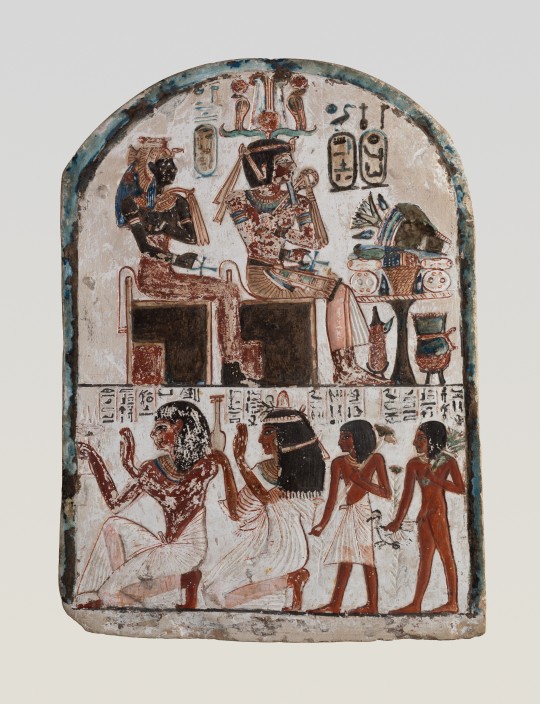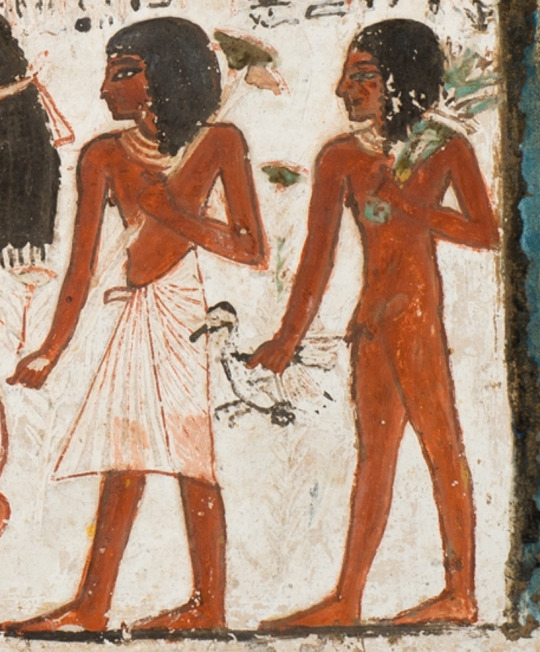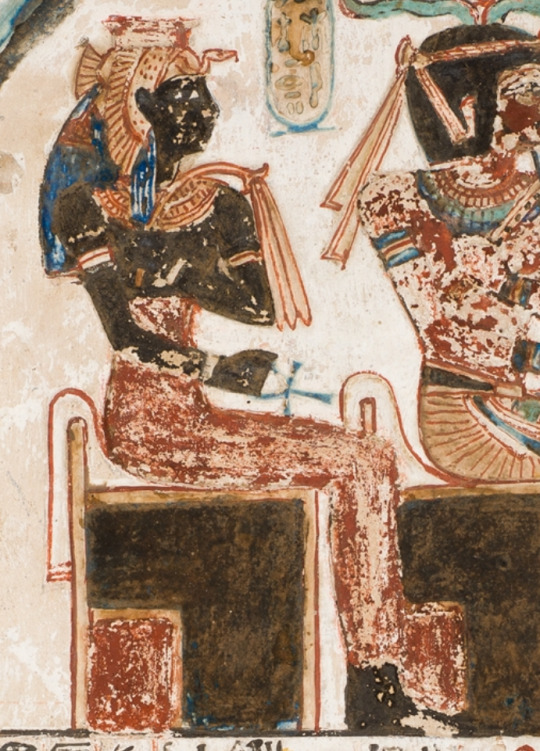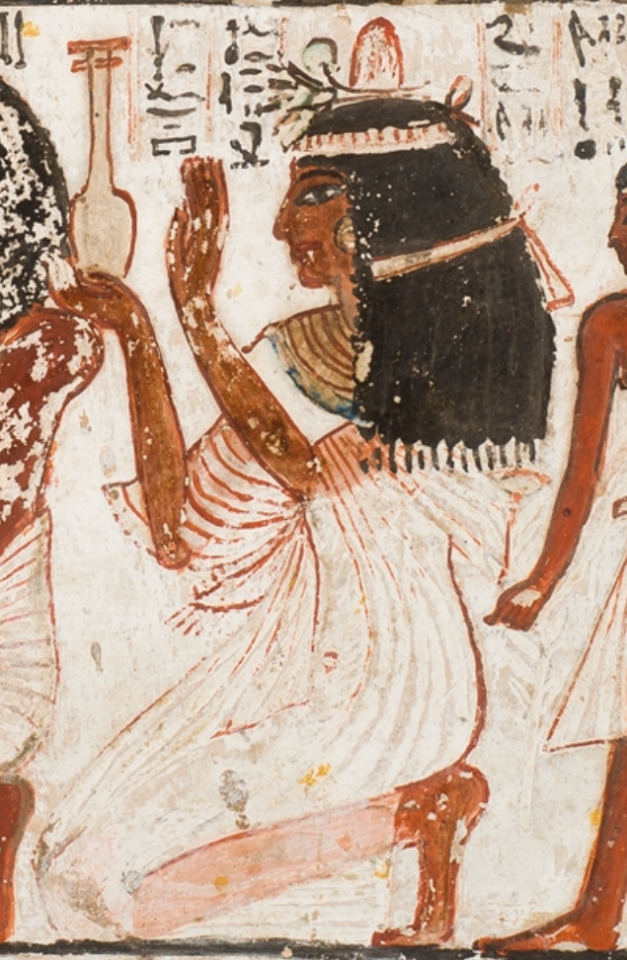#Stela of the Sculptor Qen worshipping Amenhotep I and Ahmose-Nefertari
Explore tagged Tumblr posts
Text


Stela of the Sculptor Qen worshipping Amenhotep I and Ahmose-Nefertari - Met Museum Collection
Inventory Number: 59.93 New Kingdom, Ramesside, Dynasty 19, ca. 1279–1213 B.C. Location Information: From Egypt, Upper Egypt, Thebes, Deir el-Medina, Tomb of Qen (TT 4), König 1862
Description:
One of the select "servants in the Place of Truth," Qen was a member of the community of arts and craftsmen responsible for building and decorating the tombs of the New Kingdom pharaohs in the Valley of the Kings. This stela was found in 1862 in Qen's tomb at the workmen's village of Deir el-Medina. Qen's titles, as recorded on the stela, were "sculptor of Amun in the Place of Truth" and "sculptor of Amun in Karnak" suggesting that he specialized in carving relief.
In the lower register of the stela, Qen, his wife Nefertari, and their two sons, Merymery and Huy, are shown paying homage to the two seated figures above. These represent Amenhotep I, second king of Dynasty 18, and his mother Ahmose-Nefertari. By Dynasty 19, these two deified members of the royal family had become patrons of the Theban necropolis and especially of the workmen and their families.
#Stela of the Sculptor Qen worshipping Amenhotep I and Ahmose-Nefertari#new kingdom#ramesside#dynasty 19#upper egypt#thebes#deir el-medina#deir el medina#tomb of qen#met museum#59.93#mens clothing#NKRMC
2 notes
·
View notes
Photo

Ancient Egyptian stela (painted limestone) depicting the sculptor Qen worshiping Amenhotep I and Ahmose-Nefertari. Artist unknown; reign of Ramesses II (1279-1213 BCE). From Qen’s tomb at Deir el-Medina; now in the Metropolitan Museum of Art.
#art#art history#ancient art#Egypt#Ancient Egypt#Egyptian art#Ancient Egyptian art#Egyptian religion#Ancient Egyptian religion#Ramesses II#19th Dynasty#New Kingdom#Ramesside#stele#stela#carving#limestone#hieroglyphics#Deir el-Medina#Metropolitan Museum of Art
1K notes
·
View notes
Photo

Ancient Egyptian stela (painted limestone) depicting the sculptor Qen worshiping Amenhotep I and Ahmose-Nefertari. Artist unknown; reign of Ramesses II (1279-1213 BCE). From Qen’s tomb at Deir el-Medina; now in the Metropolitan Museum of Art. #egyptology_misr #Egypte #Agypten #Egipt #Egipto #Egitto #Египет #مصر #मिस्र #エジプト #埃及 #Egypten #Visit_Egypt #discover_Egypt #Experience_Egypt #diving #socialmedia #egypt #iloveegypt #luxor #karnak #mylifesamovie #mylifesatravelmovie #travelblog #travelblogger #solotravel #wanderlust #gopro #egyptology #ancientegypt (at The Metropolitan Museum of Art, New York) https://www.instagram.com/p/CFIwRi7Fyau/?igshid=1mvkrnmo6gj26
#egyptology_misr#egypte#agypten#egipt#egipto#egitto#египет#مصر#मिस्र#エジプト#埃及#egypten#visit_egypt#discover_egypt#experience_egypt#diving#socialmedia#egypt#iloveegypt#luxor#karnak#mylifesamovie#mylifesatravelmovie#travelblog#travelblogger#solotravel#wanderlust#gopro#egyptology#ancientegypt
0 notes
Photo

Stela of the Sculptor Qen worshipping Amenhotep I and Ahmose-Nefertari ca. 1279–1213 B.C. New Kingdom, Ramesside One of the select "servants in the Place of Truth," Qen was a member of the community of arts and craftsmen responsible for building and decorating the tombs of the New Kingdom pharaohs in the Valley of the Kings. This stela was found in 1862 in Qen's tomb at the workmen's village of Deir el-Medina. Qen's titles, as recorded on the stela, were "sculptor of Amun in the Place of Truth" and "sculptor of Amun in Karnak" suggesting that he specialized in carving relief. In the lower register of the stela, Qen, his wife Nefertari, and their two sons, Merymery and Huy, are shown paying homage to the two seated figures above. These represent Amenhotep I, second king of Dynasty 18, and his mother Ahmose-Nefertari. By Dynasty 19, these two deified members of the royal family had become patrons of the Theban necropolis and especially of the workmen and their families. The Met Museum, New York Object Details Title:Stela of the Sculptor Qen worshipping Amenhotep I and Ahmose-Nefertari Period:New Kingdom, Ramesside Dynasty:Dynasty 19 Reign:reign of Ramesses II Date:ca. 1279–1213 B.C. Geography:From Egypt, Upper Egypt, Thebes, Deir el-Medina, Tomb of Qen (TT 4), König 1862 Medium:Limestone, paint Dimensions:H. 37.7 × W. 28.6 × Th 5.8 cm, 9.3 kg (14 13/16 × 11 1/4 × 2 5/16 in., 20.4 lb.) Credit Line:Fletcher Fund, 1959 Accession Number:59.93 #ancient #egyptian #history #museum https://www.instagram.com/p/CDOa_OwnCgH/?igshid=w2apfn5j2u62
1 note
·
View note
Text

Stela of the Sculptor Qen worshipping Amenhotep I and Ahmose-Nefertari - Met Museum Collection
Inventory Number: 59.93 New Kingdom, Ramesside, Dynasty 19, ca. 1279–1213 B.C. Location Information: From Egypt, Upper Egypt, Thebes, Deir el-Medina, Tomb of Qen (TT 4), König 1862
Description:
One of the select "servants in the Place of Truth," Qen was a member of the community of arts and craftsmen responsible for building and decorating the tombs of the New Kingdom pharaohs in the Valley of the Kings. This stela was found in 1862 in Qen's tomb at the workmen's village of Deir el-Medina. Qen's titles, as recorded on the stela, were "sculptor of Amun in the Place of Truth" and "sculptor of Amun in Karnak" suggesting that he specialized in carving relief.
In the lower register of the stela, Qen, his wife Nefertari, and their two sons, Merymery and Huy, are shown paying homage to the two seated figures above. These represent Amenhotep I, second king of Dynasty 18, and his mother Ahmose-Nefertari. By Dynasty 19, these two deified members of the royal family had become patrons of the Theban necropolis and especially of the workmen and their families.
#Stela of the Sculptor Qen worshipping Amenhotep I and Ahmose-Nefertari#new kingdom#ramesside#dynasty 19#upper egypt#thebes#deir el medina#deir el-medina#tomb of Qen#met museum#59.93#general childrens#NKRGC
1 note
·
View note
Text


Stela of the Sculptor Qen worshipping Amenhotep I and Ahmose-Nefertari - Met Museum Collection
Inventory Number: 59.93 New Kingdom, Ramesside, Dynasty 19, ca. 1279–1213 B.C. Location Information: From Egypt, Upper Egypt, Thebes, Deir el-Medina, Tomb of Qen (TT 4), König 1862
Description:
One of the select "servants in the Place of Truth," Qen was a member of the community of arts and craftsmen responsible for building and decorating the tombs of the New Kingdom pharaohs in the Valley of the Kings. This stela was found in 1862 in Qen's tomb at the workmen's village of Deir el-Medina. Qen's titles, as recorded on the stela, were "sculptor of Amun in the Place of Truth" and "sculptor of Amun in Karnak" suggesting that he specialized in carving relief.
In the lower register of the stela, Qen, his wife Nefertari, and their two sons, Merymery and Huy, are shown paying homage to the two seated figures above. These represent Amenhotep I, second king of Dynasty 18, and his mother Ahmose-Nefertari. By Dynasty 19, these two deified members of the royal family had become patrons of the Theban necropolis and especially of the workmen and their families.
#Stela of the Sculptor Qen worshipping Amenhotep I and Ahmose-Nefertari#new kingdom#ramesside#dynasty 19#upper egypt#thebes#deir el-medina#deir el medina#tomb of qen#met museum#59.93#womens clothing#NKRWC
1 note
·
View note